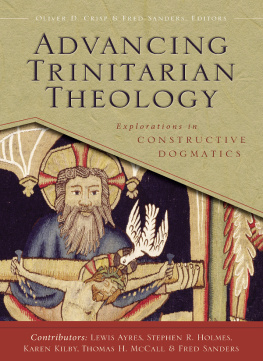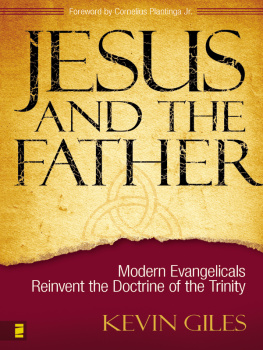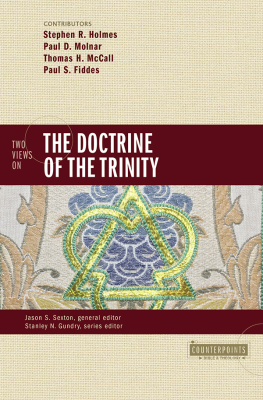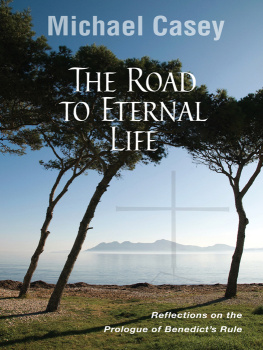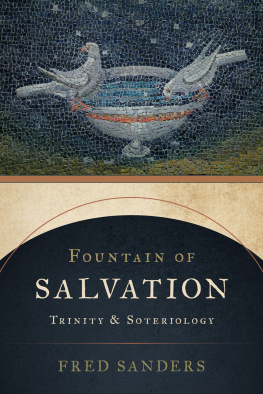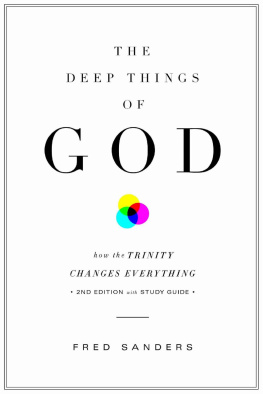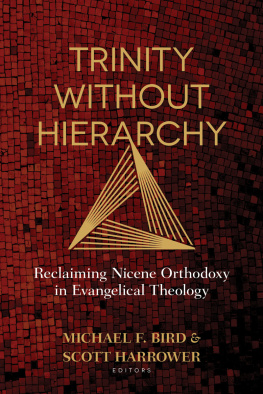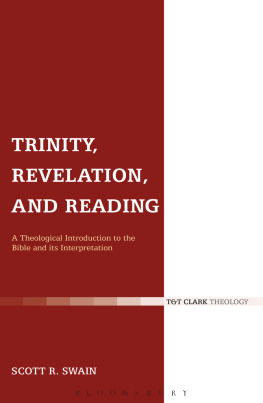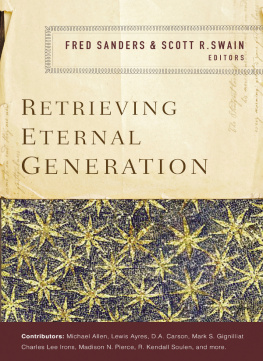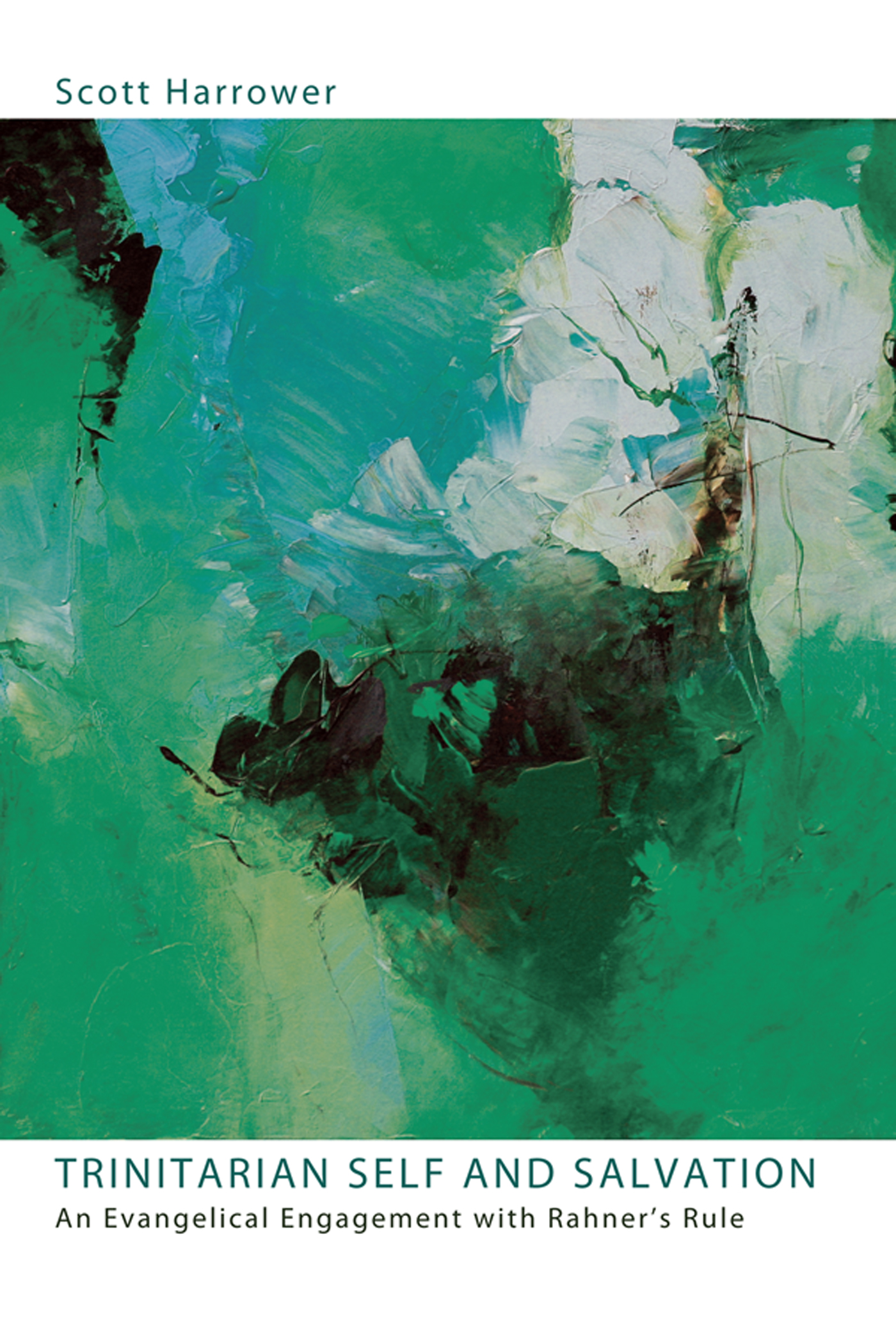Trinitarian Self and Salvation
An Evangelical Engagement with Rahners Rule
Scott D. Harrower

TRINITARIAN SELF AND SALVATION
An Evangelical Engagement with Rahners Rule
Copyright 2012 Scott D. Harower. All rights reserved. Except for brief quotations in critical publications or reviews, no part of this book may be reproduced in any manner without prior written permission from the publisher. Write: Permissions, Wipf and Stock Publishers, W. th Ave., Suite , Eugene, OR 97401 .
Pickwick Publications
An Imprint of Wipf and Stock Publishers
W. th Ave., Suite
Eugene, OR 97401
www.wipfandstock.com
ISBN : -- 61097 -
EISBN : 978-1-62189-442-1
Cataloging-in-Publication data:
Harrower, Scott D.
Trinitarian self and salvation : an evangelical engagement with Rahners rule / Scott D. Harrower.
xviii + 172 p. ; cm. Includes bibliographical references.
ISBN : -- 61097 -
. Rahner, Karl, 1904 1984 .. Trinity.. Economy of God.. Bible. N.T. LukeCriticism, interpretation, etc.. Bible. N.T. ActsCriticism, interpretation, etc. I. Title.
BT. H 2012
Manufactured in the U.S.A.
Based on Luke-Acts Scott Harrower has mounted an exegetical challenge to the strict realist reading of Rahners rule that evangelicals would be foolish to avoid. The biblical accent does not fall on the imitation of the Trinitys inner life but on the imitation of Christ in the economy of salvation. The onus is now on those who champion the rule or something like it in its strict form to meet the challenge.
Dr. Graham A. Cole
Anglican Professor of Divinity at Beeson Divinity School, Samford University
Author of Do Historical Matters Matter to Faith? ( 2012 )
The book leverages its investigation of Luke-Acts to lodge a protest against a widespread, highly influential, but seldom critically examined movement in modern Trinitarian methodology.... I commend this book as an excellent piece of research theology, the kind of solid work that captures the theological moment, advances the next few steps into new territory, and indicates where future progress lies.
Fred Sanders, from the foreword
Associate Professor in the Torrey Honors Institute, Biola University
Author of The Deep Things of God ( 2010 )
Rahners Rule has exercised massive influence over recent theology. To this point it has not, quite surprisingly, been subjected to adequate biblical scrutiny. In this insightful work, Scott Harrower takes important steps to provide such scrutiny. The result is a book that will repay careful study, and even those who are not fully persuaded by all the arguments will benefit from engagement with it.
Thomas H. McCall
Associate Professor of Biblical and Systematic Theology at Trinity Evangelical Divinity School
Author of Which Trinity? Whose Monotheism? ( 2010 )
I would like to dedicate this work to my best friend and wife:
Kate you are a rare , deep , star .
I also dedicate this work to our children, Dante, Grace, and Angela:
our own twinkling trinity.
Foreword
M odern Trinitarian theology has rejoiced in its discovery of the way God has made himself known in the economy of salvation. Operating under the broad guidance of Rahners Rule (The economic Trinity is the immanent Trinity, and vice versa), Christian theologians have traced the presence of Father, Son, and Spirit in the events of salvation history, and argued with new vigor and confidence that the relationships we see among the trinitarian persons here below are revelations of eternal triune structures immanent to the very being of God. Much of the energy and excitement of modern trinitarianism, a thriving and prolific ecumenical undertaking, have come from this project of reading the character of the eternal Trinity directly from the events of the economy.
The recent rush to the economy has much to commend it. If the doctrine of the Trinity had become austere and remote from the gospel over the centuries, the modern reorientation served to correct that tendency by locating the contents of trinitarian theology in the midst of the events of biblical history. The prevailing winds of what one writer has called neo-economic trinitarianism also dispersed a farrago of speculative metaphysical accounts of the inner life of God, distracting constructs that cumbered the theological prospect. Trinitarianism has lately been developed in greater proximity to the gospel, largely thanks to a widespread, generalized loose reading of Rahners Rule.
Such a re-centering of trinitarianism onto the economy, with its renewed attention to salvation history and its eschewing of speculation, should have resulted in a wealth of new biblical insight. If a doctrinal hypothesis is true, after all, it ought to prove itself fruitful for Bible reading. It ought to throw a more helpful light on the Bible, highlighting neglected themes and giving new prominence to terms that had heretofore been obscure. But theologians operating under the banner of Rahners Rule did not, generally speaking, use the new emphasis to seek treasures new and old in the text of Scripture. And professional exegetes have not rushed gratefully to the side of systematicians with news of discoveries made possible by the conceptual tools of the new trinitarianism. Modern trinitarianism has often enough congratulated itself on being more biblical than previous generations (I thank God that I am not like the men of the middle ages!), but with few exceptions the slogan more biblical has signified a hermeneutical wave of the hand at the general sweep of biblical history, the broad outlines of the entire scope of the canonical narrative. Valuable as this perception of the big picture may be, what has been lacking is detailed reading, the kind of close exegesis that engages hard facts, peculiar details, thick descriptions, and unexpected phraseology; the kind of thing that could either confirm or problematize the whole paradigm established by Rahners Rule.
Curiously, that kind of close study has not been carried out by self-conscious devotees of Rahners Rule, but now is being undertaken by a school of interpreters who find themselves at odds with a strict realist reading of the rule. In other words, it is not Rahners Rule that has finally motivated more careful exegesis, but the backlash against it. That backlash has so far been primarily doctrinally articulated (see the works of Molnar, Badcock, Sanders, Rauser, Jowers, et al. , cited below), but in the present work, Scott Harrower attempts a more directly exegetical critique of the strict realist reading of Rahners Rule. Harrowers claim is that Rahners Rule (strictly applied) fails to do justice to the theology of Luke-Acts, which constitutes about a third of the New Testament. In the philosophy of science following Thomas Kuhns Structure of Scientific Revolutions , there has been a debate about how many observational exceptions are necessary to bring about a crisis in a dominant theoretical paradigm. If Harrower is right, the dominant paradigm of Rahners Rule fails to account for a full third of the biblical data. Surely that amounts to a crisis for the reigning theory. Surely the scramble for a new paradigm should begin.
Strict adherents of Rahners Rule assume that every relation we see among Father, Son, and Spirit in the history of salvation is an economic enactment of an eternal state of affairs. The relations of the three persons in time, that is, all have an eternal analogue immanent to Gods triune being. If the incarnate Son obeys and submits to the authority of the Father who sent him (to take the example that most exercises Harrower), it is because the eternal relationship he has toward the Father is a relationship of obedience and submission. The greatest contribution that Harrower makes to the current discussion is that he tests this kind of application of Rahners Rule by seeing if it can apply to Luke-Acts without reservation. Convinced that if one is going to employ the [strict realist reading] of [Rahners Rule] to the narrative of Luke-Acts, then one must apply it to the whole narrative and not selectively, he devotes several chapters to showing what would follow from interpreting all the economic-trinitarian activity of Luke-Acts as revelatory of immanent-trinitarian states of affairs. The result is reductio ad absurdum : The lines of authority, for example, are criss-crossed multiple times, with the Son alternately carrying out the Fathers will at one moment, and then exercising dominion over the Fathers self-revelation the next (much hangs on Harrowers interpretation of Luke :). Similarly, Luke-Acts presents the Spirit conceiving and then impelling the Son in earlier moments, but bearing witness to and being dispensed by the Son at later moments. All of this makes perfect sense narratively and chronologically; in fact one of Harrowers strengths here is his engagement of recent Luke-Acts scholarship with its emphasis on narrative unfolding (Kavin Rowe and Andy Johnson, among others). But what if the entire sequence of reversible subordinations were to be transposed into the eternal nature of God? They would be not so much mutual submission as mutually exclusive subordination.


